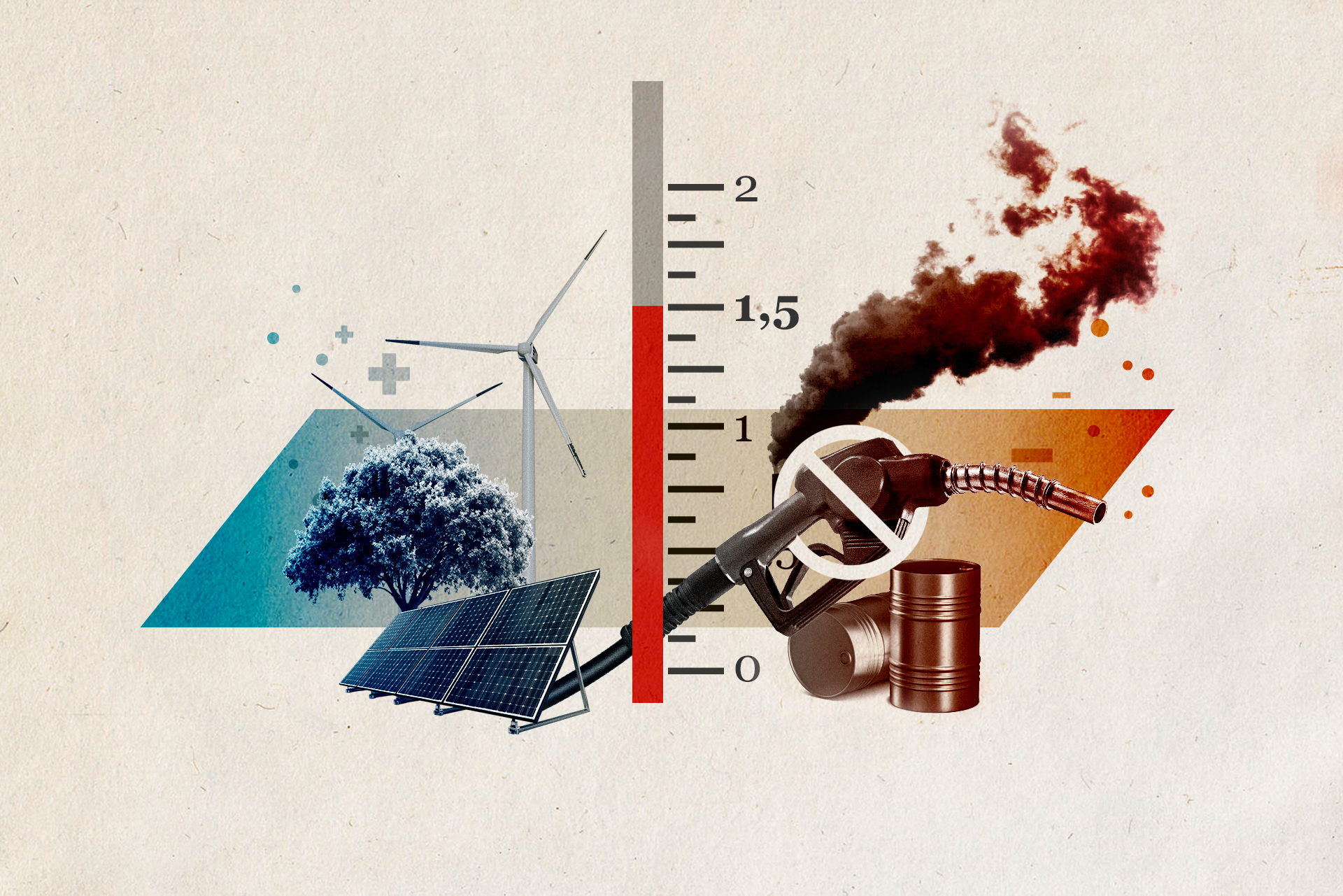
We can still solve the climate crisis – here’s how

Greenhouse gas emissions and temperatures continue to rise around the world. But there are solutions, say researchers in Switzerland who took part in Swissinfo's survey on the state of the climate.
Ten years after committing to an ambitious plan to lower emissions and limit temperature increases, countries that signed on to the Paris Agreement are still far from their goals.
This is made clear in the latest reportExternal link from the United Nations Environment Programme (UNEP), published this month, which analyses current climate policies. According to the report, if all global commitments to reduce emissions were fully implemented, the planet would still face warming between 2.3°C and 2.5°C above pre-industrial levels. The Paris Agreement’s goal is to limit temperature rise this century to below 2°C, ideally 1.5°C.

More
Climate experts in Switzerland: 1.5°C target is out of reach
Many of the 80 climate researchers in Switzerland who took part in a Swissinfo survey on the anniversary of the historic agreement predict similar levels of warming. However, they emphasise that solutions and tools already exist to tackle the climate crisis and accelerate the transition to a low- or zero-emission society. These are some of the most promising:
Trust in technology and the courts
Despite their dire predictions related to carbon emissions, most scientists who participated in the survey are optimistic about technological progress, economic incentives for decarbonisation, and citizen climate movements.
“Today we are fully capable of giving up fossil fuels, both for heating buildings and for transportation,” says Martine Rebetez, professor of applied climatology at the University of Neuchâtel and the Swiss Federal Institute for Forest, Snow and Landscape Research (WSL).
Rulings by national and international courts can also support the global transition away from fossil fuels, according to climate researchers. Individuals and organisations are turning to the courts to challenge governments’ inadequate climate policies or to hold fossil fuel companies accountable for their CO₂ emissions.
In July 2025, the International Court of Justice – the UN’s main judicial body – stated in an advisory opinion that countries have a legal obligation to act against climate change. In 2024, the European Court of Human Rights in Strasbourg condemned Switzerland for failing to implement sufficient climate policies.

More
Indonesians vs Swiss company Holcim: ‘We want to save our island’
The importance of individual behavior and nature-based solutions
When asked what holds the greatest potential to help meet climate goals, most climate experts in Switzerland point to large-scale behavioural change – though they say this must be supported by systemic change on the political and industrial levels.
Having the right policies, infrastructure and technology in place to enable a more climate-friendly lifestyle and behaviour, such as eating less meat or limiting the use of fossil-fuel-powered transport, could cut emissions by 40% to 70% by 2050External link, according to the Intergovernmental Panel on Climate Change (IPCC).
Nature-based solutions, such as protecting and restoring ecosystems, and to a lesser extent carbon capture and storage (CCS), can also help address the climate crisis, according to the survey. But before turning to CCS technologies, “we must abandon fossil fuels and massively scale up renewable energy,” says Yann Yasser Haddad, who studies climate impacts on energy systems at ETH Zurich.
In September 2025, Swissinfo send out a survey asking scientists working on climate change in Switzerland 22 questions focused on the state of climate research, policy and global warming ten years after the landmark Paris Agreement on climate change.
The survey was sent to 108 climate scientists working at the following institutions: EPFL, ETH Zurich, University of Neuchâtel, University of Zurich, University of Bern, University of Basel, University of Geneva, University of Fribourg, University of Lausanne, Paul Scherrer Institute, Swiss federal Institute for Forest, Snow and Landscape Research (WSL), Swiss Federal Laboratories for Materials Science and Technology (EMPA) and MeteoSwiss.
Eighty researchers completed the survey. Find the results here.
Accelerating the transition to renewables
Many survey respondents emphasise the importance of developing renewable energy sources. “Solar and wind energy have become much cheaper and more accessible over the past ten years. This is the most promising development because we need to accelerate the transition to renewables,” says Andrea Farnham, who conducts climate research on the Global South at the University of Zurich.
Martine Rebetez says it’s not technical or financial issues hindering the expansion of renewables, “but the oil lobby”. An investigation by the newspaper The GuardianExternal link, published in 2024, revealed that the oil industry in Europe and the United States has fought against government support for clean technologies for over half a century.
Only a minority of climate researchers see nuclear energy as an option. While nuclear power does not produce CO₂ emissions, it does carry environmental and safety risks. Even fewer survey participants place trust in climate geoengineering – a highly controversial strategy that involves deliberately altering the climate to reduce global temperatures.
Carbon taxes, e-mobility and simple living
“If we don’t reduce emissions by 90%, no technology will be able to help us,” University of Bern senior scientist Jens Terhaar, who has published studies on the oceans’ CO₂ absorption, states in a survey response.
Restrictions on fossil fuels – including outright bans – and taxes on CO₂ are the most effective policy tools to reduce emissions in Switzerland, according to most of the climate researchers who participated in the survey.
“Global commitments to reduce emissions are either not ambitious enough or not being met. Carbon taxes can be implemented relatively easily and can push individuals and companies to meet climate goals,” says Farnham, at the University of Zurich.
Switzerland was among the first countries in the world to introduce a CO₂ tax in 2008. This tax applies to fossil fuels (heating oil and natural gas) and has significantly helped reduce building emissions – down 44% between 1990 and 2022.
Despite the decline, the building sector – along with industry and transport – remains one of the largest sources of emissions in Switzerland. Survey respondents say government subsidies for energy-efficient home renovations are an important policy tool to reduce the country’s climate impact. Respondents also largely favour investments in public transport and financial regulations to encourage environmentally sustainable investments.
Martine Rebetez calls for more incentives and fewer barriers to electric mobility. “The current system subtly hinders the transition from combustion vehicles to electric ones,” she says. That’s in part because since early 2024, the import tax in Switzerland has also been applied to electric vehicles.
There are other ways to limit our climate footprint without having to wait for political decisions or technological advances, according to some respondents. Philippe Renard, professor of hydrology at the University of Neuchâtel, says the most effective way to reduce emissions is to live more simply and generally consume less energy. “We need to learn to enjoy a simpler life,” he says.
What is your opinion? Join the debate:
Edited by Gabe Bullard/Vdv

In compliance with the JTI standards
More: SWI swissinfo.ch certified by the Journalism Trust Initiative
































You can find an overview of ongoing debates with our journalists here . Please join us!
If you want to start a conversation about a topic raised in this article or want to report factual errors, email us at english@swissinfo.ch.